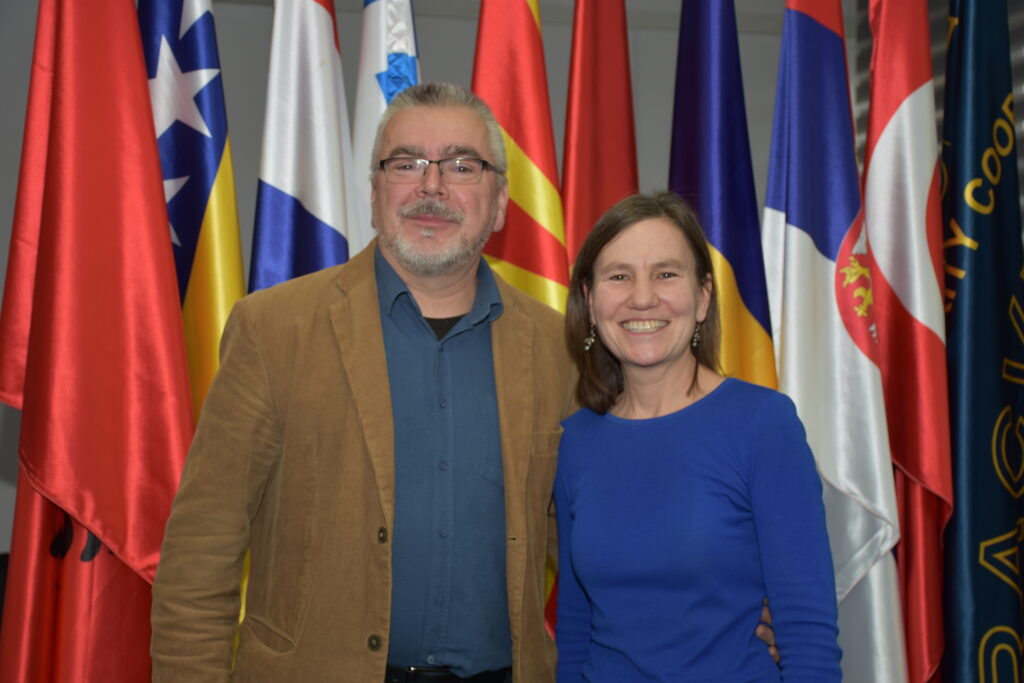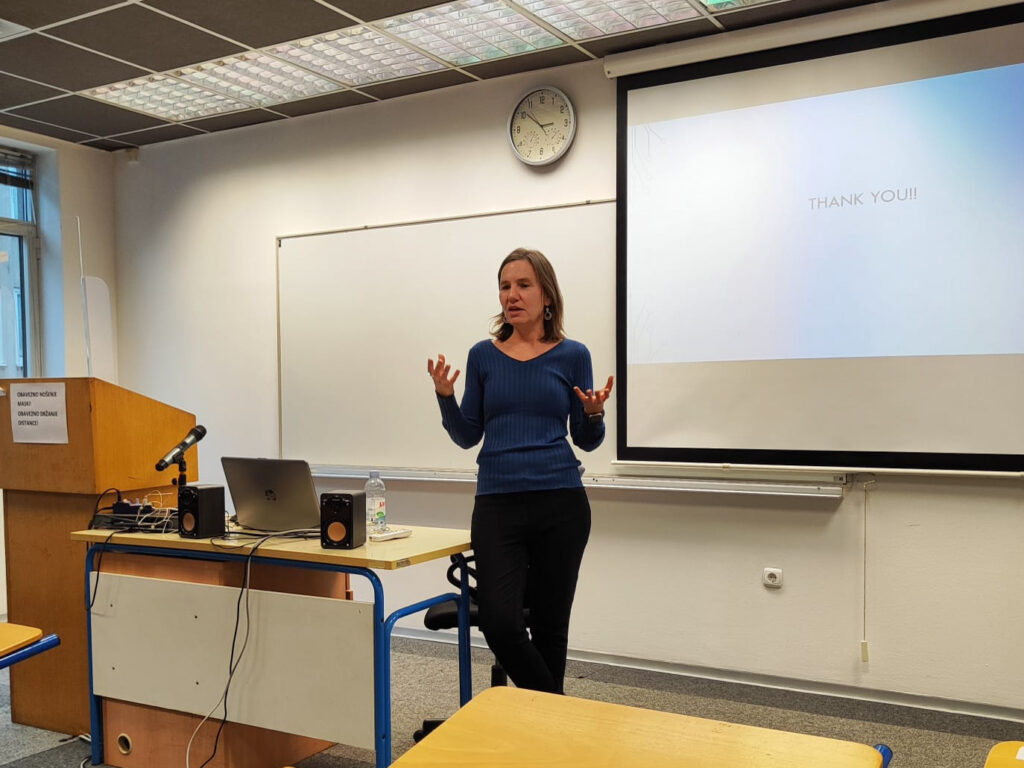Long ago, learning a second (and third) language as a teenager sparked my interest in international travel, which – after experiencing that travel – inspired me to study International Relations. This eventually led to my academic career and to the Fulbright-Schuman European Union Affairs award, so it seems apropos to return to these roots here. I spent the last four months in three countries – Italy, Romania, and Croatia – studying intergovernmental organizations and regional cooperation in Southeastern Europe. The remarkable proliferation and persistence of regional organizations linking governments from the Balkans and beyond since the fall of communism seemed an understudied but important phenomenon. These organizations emerged despite – and in many ways because of – the wars of the 1990s and their members’ Euro-Atlantic integration goals. In both my research and travels, I noticed how language can be both a bridge builder and a barrier. Languages dictate who we speak with, who we listen to, and where we get our information. A common language is a sine qua non for communication and cooperation across borders, whether for individuals, businesses, or governments.
Large international organizations like the United Nations (UN), the Organization for Security and Cooperation in Europe (OSCE) and the European Union (EU) have more than one official language – the UN and OSCE have six, the EU 24 – and they have a band of translators and interpreters to enable official multilingual communication in meetings and translation of documents. This can be costly and time-consuming, but supports national identity, helps keep small languages alive, and keeps skilled linguists employed. Working and “procedural” languages, however, may be fewer. For example, EU bodies like the European Commission and European Parliament use English as their main language of communication, Brexit notwithstanding. This was not always the case and emerged in no small part due to the EU’s enlargement to Central and Eastern Europe. Today, English is understood by more people than any other single language in the EU, even if it is the first language of only 1%. [1]
In the smaller international organizations I studied, English is the only official and working language, even if it is not the first language of any of its core members. There is no translation provided; staff and member state representatives, as well as those who attend meetings, workshops, and seminars are normally expected to be fluent in English. This is not necessarily a problem. Croatians, for example, start to learn English in 1st grade (I had to wait until 8th for a second language). The prevalence of English language films, television shows, music, and social media certainly helps with language learning, and in countries where one’s native language may not be spoken widely beyond their borders, learning other languages may well be seen as a necessity.

Despite the prevalence of English at many international organizations, it is not the only language you will regularly hear, nor the only useful language to know. Even in cases where all meetings are in English, staff naturally revert to the native language of those present in hallway discussions, coffee breaks, and other informal conversations. In the case of Southeast European subregional organizations, speakers who in a previous time shared the Serbo-Croatian language still tend to gather as a language group, even if they may be speaking mutually intelligible Serbian, Croatian, or Bosnian, while those from Albania, Greece, or Turkey more often gather with their compatriots or alternatively with each other, using English as their common second language. Likewise for other languages. We are still both connected and divided by language.
I was consistently reminded of this in my Fulbright travels as well. Upon arrival at my dorm in Bucharest, for example, knowing French (well enough) got me much needed information and assistance from the researcher I met across the hall from the DRC who spoke little English. Nonetheless, I found myself more often communicating with the hallmates I later met from Cameroon and Italy, for whom English was our common language. When all meeting as a group, our Cameroonian colleague usually provided English-French interpreting. Subsequently, it was only when I bothered to read the fine print on my milk and orange juice containers in Romania(n) that I learned I should consume (actually, should have consumed) these items in 2-3 days at most, unlike our products in the US that last much longer. Ignoring the local language could be dangerous! Knowing a bit of German meanwhile certainly helped navigate the washing machines in multiple countries (which, by the way, have incredibly long cycles when compared to the US!)

University professors I met sometimes taught courses in English and often share and publish their research in English. The University of Bucharest Faculty of Political Science offers its degrees in three languages – Romanian, English, or French. In navigating my way around town in all three countries and at my host international organizations and universities, most people I met switched effortlessly to English to communicate with foreigners like me and I could easily rely on English most of the time. Yet, whenever I could converse with someone in their own language, understand their discussion, or read something otherwise unintelligible in my non-native language, even if something as simple as a street sign or a posted message, I always felt like I’d unlocked some hidden code. Having studied Italian, Romanian, and French as well as two Slavic languages – despite not being nearly fluent in these languages today – surely enhanced my Fulbright experience. In my past travels, I fondly remember that learning some Chinese characters gave me access to some of the most amazing Szechuan dishes at a local joint in Chengdu, China rather than being confined to the restaurants with English menus specifically catering to tourists. Even in places where English menus are readily available, being able to understand some of the local language always feels like a more authentic experience providing a better understanding of the local culture, including the food! Sdrukli, ćevapčići, fritule, kremšnita, kuhano vino, salata de vinete . . . none of these sound quite correct (or nearly as good) in translation.
Access to knowledge and people is largely determined by language, whether you are a student, scholar, government, or otherwise. (Misinformation and disinformation also rely on a common language to readily spread). Google Translate and similar apps have recently become a useful tool for travelers, but work much better as a supplement than as a good replacement for language skills. Without translators and/or common languages of communication, there would be no intergovernmental organizations and limited international cooperation. A common language (whether native or borrowed) certainly does not prevent disputes or even war between countries, but it is essential for communication, and thereby goes a long way towards reducing misunderstandings and confrontation. English has become an important facilitator of transnational communication and cooperation and in many ways is becoming the lingua franca of international organizations. At the same time, speaking a language other than your native tongue gives you access to more intercultural (and practical) knowledge and understanding, different experiences, and communication with more people than you otherwise would enjoy.
[1] Dave Keating, “Despite Brexit, English Remains the EU’s Most Spoken Language by Far,” Forbes, 6 Feb. 2020; Anna Codrea-Rado,” European parliament has 24 official languages, but MEPs prefer English,” The Guardian, 21 May 2014.
Melanie H. Ram received a 2022-2023 Fulbright Schuman European Union Affairs award and studied sub-regional organizations and regional cooperation in Central and Eastern Europe. She was hosted by the Central European Initiative in Italy, RACVIAC – Centre for Security Cooperation in Croatia, the University of Zagreb, and the University of Bucharest and conducted archival research and elite interviews while engaging with local scholars and students. Dr. Ram earned her Ph.D. in Political Science from George Washington University in Washington, DC and is currently a professor of International Relations at California State University, Fresno.
Articles are written by Fulbright grantees and do not reflect the opinions of the Fulbright Commission, the grantees’ host institutions, or the U.S. Department of State.
